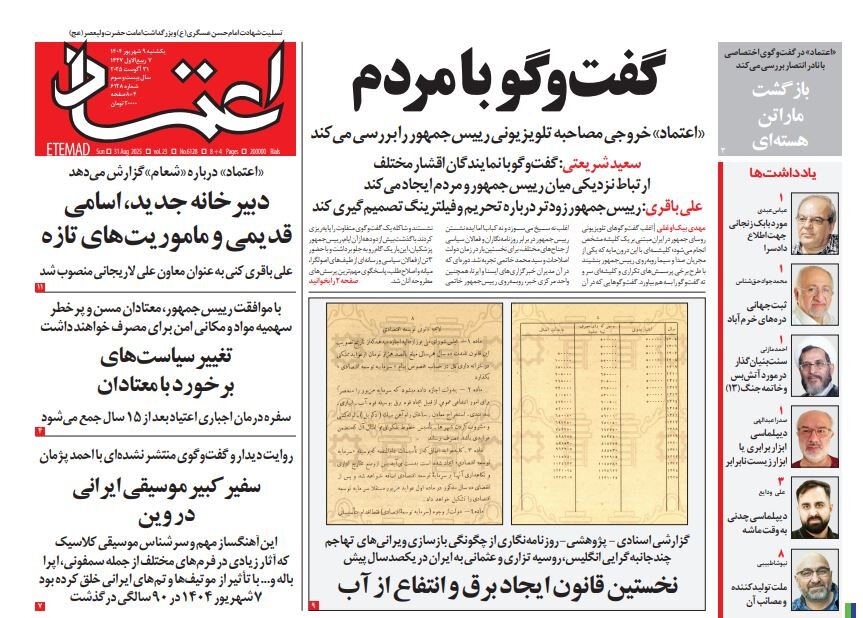Either seeking diplomacy or rushing to sanctions

TEHRAN - Etemad examined Europe's haste to send a letter to the United Nations Security Council to invoke the snapback mechanism in an interview with Rahman Ghahremanpour, an expert on international affairs.
He said: Europe's haste to send a letter to the Security Council to activate the snapback mechanism on Thursday probably has two reasons. From an optimistic point of view, this action can be considered an attempt by Europe to provide more opportunities to look for diplomacy and guide Iran towards finding a diplomatic solution. In this context, sending the letter on Thursday instead of Saturday (end of August) creates a two-day opportunity that can be used in the diplomatic process if Iran responds positively. However, from a pessimistic point of view, the Europeans' haste may be due to the dissatisfaction with the results of last Tuesday's meeting, as well as Europe's emphasis on its firm determination to invoke the snapback mechanism. In this context, sending a letter to the UN two days earlier sends message that shows Europe has no hesitation in implementing the snapback mechanism and that if their demands are not met, they will act without hesitation.
Javan: Iran will act in a multifaceted manner while preserving right to defend itself
In an analysis, Javan examined the West's approach toward the Iran nuclear issue. It said: Activating the snapback mechanism after the United States’ direct attacks on nuclear infrastructure in the 12-day war is a repetition of excuses and a demonstration of new political games by the West. However, Iran has the right to act against these excuses and defend its nuclear rights (under the NPT). One of these measures is to make activities against Iran costly for the West. The plans being considered in the parliament will be Iran's withdrawal from the NPT, the cessation of any negotiations with the U.S. and the three European countries, and the end of supervisory cooperation with the International Atomic Energy Agency. The activation of snapback shows that Iran’s transparent cooperation with the International Atomic Energy Agency on its nuclear activities has brought no effective benefit for Tehran. Also, the Agency, which today has clearly turned into a tool of intelligence for America in Iran’s nuclear affairs, urgently seeks a return to the country. So, refusing cooperation with the Agency will harm the United States and, as a result, will put the Agency in a difficult position.
Shargh: There is no way but to engage in the coming month
Shargh examined the 30-day deadline to prevent the snapback mechanism from being activated in an interview with political expert Abolghasem Delfi. He said: Over the past two decades, the Europeans have always considered themselves to have the most rights and greatest influence in the nuclear talks. The Europeans are trying to increase their diplomatic influence through the snapback mechanism. In the remaining month, the status of Iran’s cooperation with the International Atomic Energy Agency (IAEA) and engagement with the United States will be decisive. A large part of the current problems can be solved if Iran and the Agency can reach an understanding to assess the nuclear situation and present acceptable reports. The conditions ahead include two time periods. The first period is one month, which is a diplomatic opportunity to determine the task of cooperation with the Agency and the uranium stockpile; and the second period, after the end of this period, is the return of sanctions and the activation of the snapback mechanism which will increase the possibility of further tensions and even military threats. The 30-day deadline to prevent the activation of the snapback mechanism means that we must use all our efforts to neutralize the anti-Iran movements by the European troika.
Arman-e-Melli: Illegal action and political excuse
In a commentary, the Arman-e-Melli newspaper have said the Europeans which have been passive toward the violation of the 2015 nuclear deal (by the United States since 2018) and therefore have no legal right to invoke the snapback mechanism. It said: Westerners have always tried to follow a policy of pressure and intimidation. On the other hand, they have fundamentally rejected and ignored Iran's logical and verified actions based on the (2015) nuclear agreement. It must be noticed that the Europeans in their letter to the Security Council have thrown the ball into Iran's court to make Iran appear guilty. However, it is quite clear that Europe has been in a state of complete inaction for the past seven years and basically has no legal right to trigger the snapback mechanism. Writing letter to the UN Security Council to activate the snapback is a political move. It remains to be seen whether the Europeans will continue this wrong move or will change course. Nevertheless, it remains to be seen how the Security Council will deal with the issue.
Leave a Comment